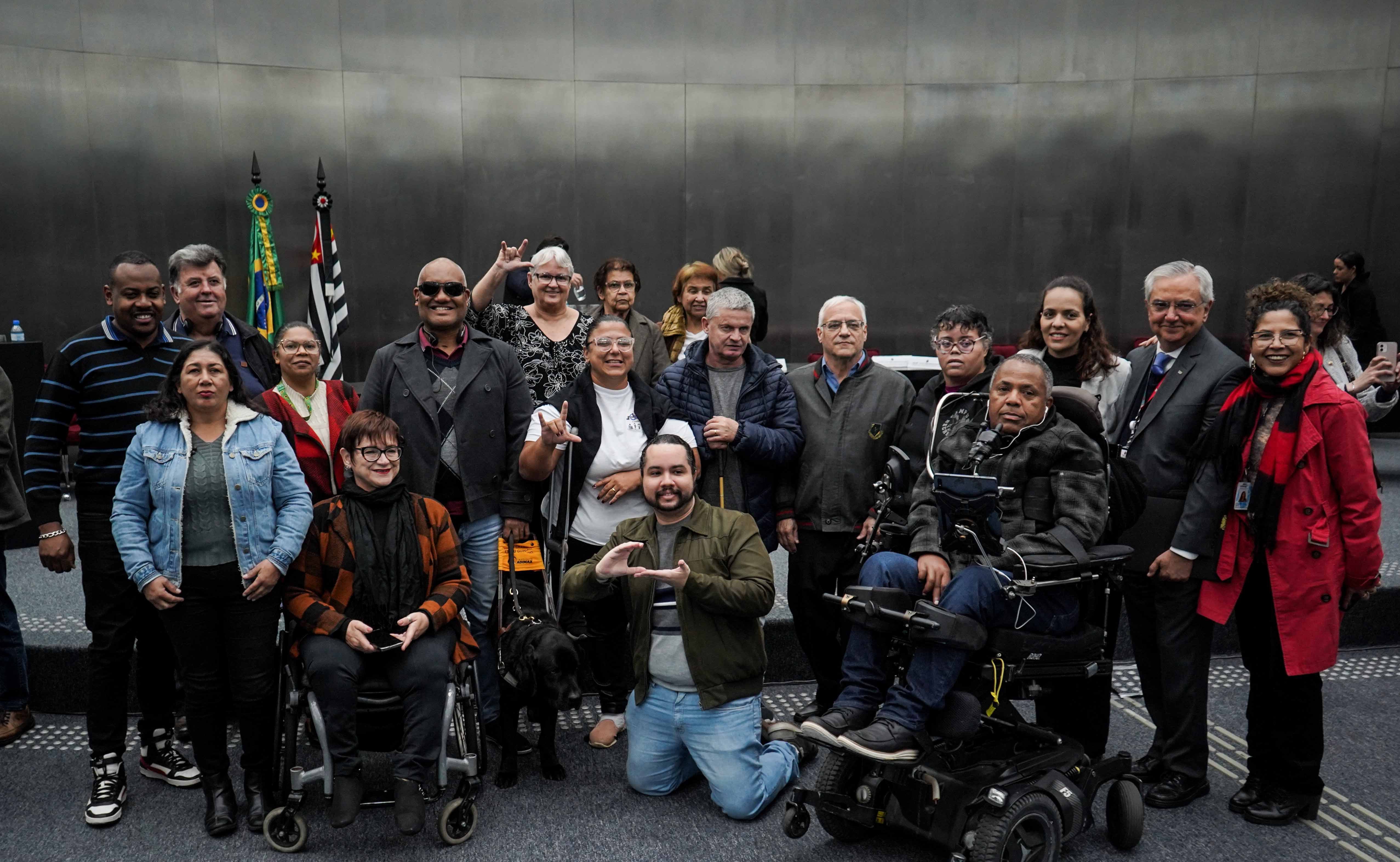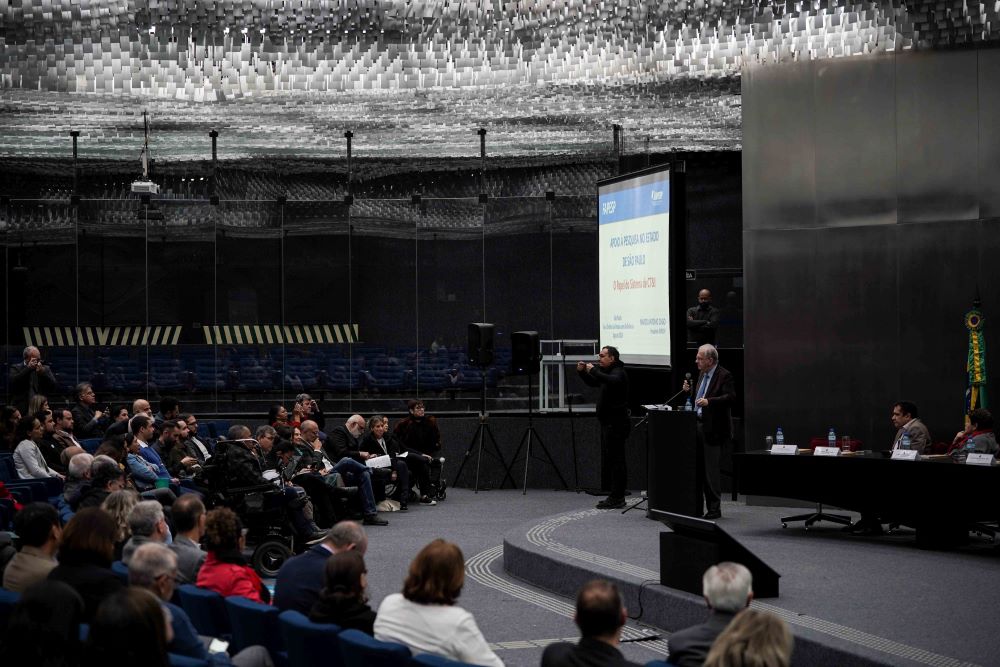

The launch ceremony took place on August 14 at the Museum of Inclusion (photo: Daniel Antônio/Agência FAPESP)
Partnerships among departments of the São Paulo State Government, universities and research centers aim to meet society’s needs by developing devices, software and processes that promote assistance, rehabilitation, and better lives for people with disabilities.
Partnerships among departments of the São Paulo State Government, universities and research centers aim to meet society’s needs by developing devices, software and processes that promote assistance, rehabilitation, and better lives for people with disabilities.

The launch ceremony took place on August 14 at the Museum of Inclusion (photo: Daniel Antônio/Agência FAPESP)
By Maria Fernanda Ziegler | Agência FAPESP – The Center for Technologies to Assist Activities of Daily Living (TECVIDA), hosted by the University of São Paulo’s Engineering School (POLI-USP), will develop exoskeletons and lighter, more robust and more affordable motorized wheelchairs. Its R&D activities are conducted by researchers affiliated with USP’s Medical School (FM) and the São Carlos Engineering School (EESC), as well as the Mara Gabrilli Institute, Voltta Fitness, and the Technological Research Institute (IPT), linked to the São Paulo State Department of Economic Development, Science and Technology. It also partners with the São Paulo State Departments of Disability Rights and Health.
The State University of Campinas (UNICAMP), on the other hand, hosts TAAL – the Center for Assistive Technology and Accessibility in Brazilian Sign Language or LIBRAS –, which will use machine learning to create an application that translates automatically from Portuguese to LIBRAS and vice-versa.
The Multidisciplinary Center for Development of Assistive Technology (CMDTA), hosted by the São Paulo State University (UNESP) in its Bauru campus, will create a network of laboratories for R&D in prosthetics, orthotics and Braille systems technologies.
Lastly, the Center for Assistive Technology for Bilingual Deaf Education (TAEBS), a partnership between UNICAMP and the City of Campinas Department of Education, will develop teaching material for deaf students.
These four new centers were launched on August 14 by FAPESP after approval in the third call for proposals issued under its Science for Development Center (CCD) program. The launch ceremony took place at the Museum of Inclusion in São Paulo city. FAPESP is investing BRL 29 million in the projects and partnering with the São Paulo State Department of Disability Rights, the Campinas Department of Education, public universities, and research institutions.
“Today is a day for commemoration, and commemorating is important because it sets examples, creates publicity, and attracts fresh initiatives,” said Marco Antonio Zago, President of FAPESP. “We’re commemorating the launch of four new CCDs, and the secretaries present here today have promised to create more. In São Paulo, we have a very mature science, technology and innovation [ST&I] system involving both academia and more than 10,000 private-sector companies that invest in research, development and innovation. FAPESP is committed to collaborating to promote inclusion and improve people’s lives.”

Zago highlighted the robustness of São Paulo state’s science, technology and innovation system (photo: Daniel Antonio/Agência FAPESP)
Marcos da Costa, São Paulo State Secretary for Disability Rights, also commemorated the launch of the new CCDs. “As soon as the call for proposals was published, we went to FAPESP to talk to Professor Zago and began to dream. Our researchers can change the world, and these projects we’re unveiling today will facilitate access to assistive technologies,” said Costa, who is participating in the first three of the above centers.
All 49 CCDs approved in three calls are conducting research projects oriented to solving problems defined by government and society.
“You hear a lot about building ties between academia and society, but government should also be close to academia and society. That’s why FAPESP’s support for interaction between academic research and government is such a commendable initiative. The Science for Development Centers equation is simple: government raises the problems, FAPESP issues a call for proposals, and research centers come forward to solve these problems. In other words, it’s science, technology and innovation in favor of developing public policies,” said Science, Technology and Innovation Secretary Vahan Agopyan.
Co-funding model
FAPESP has invested a total of BRL 324 million in projects selected under calls issued in 2020, 2021 and 2023.
All projects are co-funded so that FAPESP and partner entities invest matching amounts. Funding is long-term, lasting up to five years, and projects must have clear governance, mechanisms for review throughout their duration, and intermediate goals. The results must promote the advancement of knowledge and help improve public policies.
The aims of these three calls were to identify, measure and detail major public challenges in São Paulo state, and to bring together and organize institutional actors in pursuit of adequate solutions to resolve or diminish the bottlenecks in question.
The CCD program receives proposals submitted by consortia of researchers affiliated with universities and research institutions in the state, managers of state and municipal government agencies, companies, and non-governmental organizations (NGOs).
“The number of proposals submitted fell during the pandemic. Science production and organization to apply for funding declined. Growth resumed in 2022, and the funds kept in the vault are now being used to create CCDs, a means of combining the efforts of academia, government and companies in projects oriented to solve problems presented by society,” Zago said.
Also on August 14, a joint call for proposals was issued by USP, UNICAMP and UNESP, which will invest BRL 10 million to support the development of assistive technologies.
“Public universities in São Paulo state are ready to tackle any challenge presented by society. This is why we’re putting money into the universities to support the cause of inclusion. We expect our researchers to respond to this call by collaborating on the development of solutions to problems in our society and contributions to public policymaking. The purpose of universities is to produce knowledge and transfer it to society as quickly as possible,” said Carlos Gilberto Carlotti Jr, Rector of USP.
The launch event at the Museum of Inclusion was also attended by Vinicius Neiva, Executive Secretary, São Paulo State Department of Education; Ana Maria Frattini Fileti, Pro-Rector for Research, UNICAMP; Pasqual Barretti, Rector, UNESP; Maria de Jesus Dutra dos Reis, Vice Rector, Federal University of São Carlos (UFSCar); Claudia Regina Vieira, Pro-Rector for Community Affairs and Affirmative Policies, UFABC; Anderson Ribeiro Correia, CEO, IPT; Ignácio Maria Poveda, Special Advisor to the Secretary, São Paulo State Department of Disability Rights; Arturo Forner Cordero, Principal Investigator at TECVIDA; José Mario de Martino, PI at TAAL; Carlos Roberto Grandini, PI at CMDTA; and Ivani Rodrigues Silva, PI at TAEBS.
Republish
The Agency FAPESP licenses news via Creative Commons (CC-BY-NC-ND) so that they can be republished free of charge and in a simple way by other digital or printed vehicles. Agência FAPESP must be credited as the source of the content being republished and the name of the reporter (if any) must be attributed. Using the HMTL button below allows compliance with these rules, detailed in Digital Republishing Policy FAPESP.





